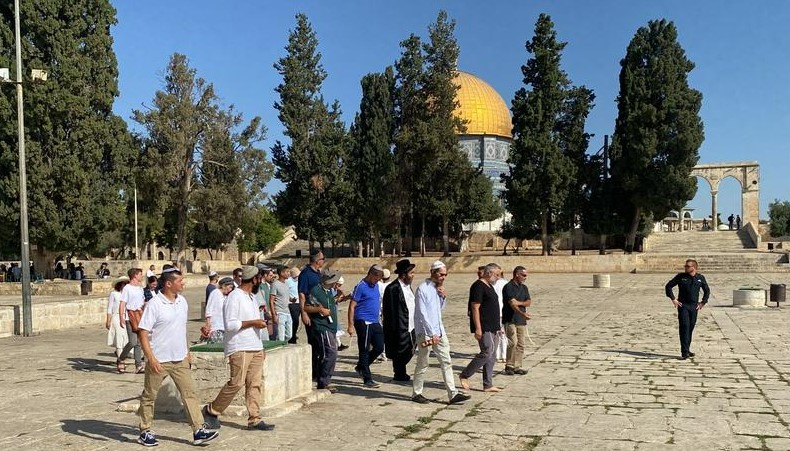It appears that Sunday’s special entry does not signify a new permanent arrangement.
By Aryeh Savir, TPS
A group of Jewish worshipers entered the Temple Mount on Sunday through the Gate of the Tribes in the northern part of the Mount, the first such occurrence since 1967, when liberating IDF paratroopers entered the holy site during the Six-Day War.
The group was escorted by a Temple Mount police officer. Upon conclusion of the visit, some left through the same gate.
Tom Nisani, CEO of Beyadenu for the Temple Mount (‘Beyadenu’ is Hebrew for ‘It’s in our hands’) said that the “Jewish entry through the Gate of the Tribes shows that there is no justification for the threats and claims that if we exercise our sovereignty and basic freedoms on the Mount, terrible things will happen.”
“This morning, Jews entered through the Gate of the Tribes smoothly and without any problem. This precedent should be first implemented on special occasions when many Jews ascend the Mount through the Hallel [Mugrabim] Gate, which cannot facilitate all of them. It is a positive development,” he said.
Jews have been allowed to enter the Temple Mount only through the Mugrabim (Moroccan) Gate, which is right next to the Western Wall. The other nine gates around the Temple Mount are reserved for Muslims.
The Gate of the Tribes, Bab al-Asbat in Arabic, is located in the northeast corner of the Temple Mount, near the Lions’ Gate, which was also formerly called the Gate of the Tribes. The gate is near the “Pool of Israel” and the “Tower of the Children of Israel,” both names preserved by the Muslims.
The Palestinian Authority’s Ministry of Jerusalem Affairs said that it views the development “with grave concern.”
“The Israeli occupation persists in its dangerous attempts to change the religious, historical, and legal status quo of the mosque,” the ministry alleged, saying that Jews visiting the Temple Mount is a “direct provocations of the feelings of all Muslims around the world.”
The PA called on the Arab and Islamic countries and the international community to “uphold their responsibilities and stop the Israeli violations, which are becoming more dangerous at al-Aqsa mosque and portend dire consequences.”
Sheikh Omar Kiswani, director of the Temple Mount mosques, described the incident as “a serious step that violates the status quo at the holy site and the agreements signed between Israel and Jordan concerning the affairs of the mosque.”
It appears that Sunday’s special entry does not signify a new permanent arrangement.
Jews’ visits to the Temple Mount, Judaism’s holiest site, are limited in time and space, as well in as the number of visitors allowed access at any given time. While Jews’ rights to worship at the site have improved in recent years, much remains wanting, and full freedom of worship has yet to be granted by the State of Israel to Jewish visitors.
While Muslims enter the holy site freely, Jews are screened by metal detectors, undergo security searches, and are banned from bringing Jewish religious objects to the site.


